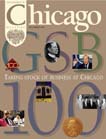The University of Chicago Magazine
December 1997
![]()

Chicago and its discontents: Although it was shot in early fall, the photograph above, which was taken by Hyde Park photographer Eugene Zakusilo (see "Frames of Mind," page 22), has a wintry aura, in part because the harsh contrasts of the printing technique make the images seem sculpted in ice, in part because of the statue's strong lines, and in part because of the subject the sculpture honors.
Watching over the Midway Plaisance, the Masaryk Memorial Monument's bronze horseman represents the knights of Bohemian legend who stood guard at the Blanik Mountain. The horseman also recalls a real-life defender of his country: Thomas Garrigue Masaryk (18501937), the philosopher turned political leader who was Czechoslovakia's first president. Whether as statesman or as professor, Masaryk never shied away from hard issues; as a philosopher, his first major work was entitled Der Selbstmord als sociale Massenerscheinung der modernen Civilisation (suicide as a mass phenomenon of modern civilization). Definitely a wintry topic.
Yet many wintry topics, like wintry scenes-and winter itself-have their own rewards, something that University of Chicago students, faculty, and alumni have long known. Such pleasures go far beyond the occasional fun of skating on the Midway and the more regular, if more perverse, pride in surviving icy blasts of wind from Lake Michigan.
If winter is the season of our community's discontent, it may not be a bad thing. After all, as University of Virginia professor Mark Edmundson argued in a recent issue of Harper's Magazine, "some measure of self-dislike, or self-discontent-which is much different than simple depression-seems to me to be a prerequisite for getting an education that matters." If we aren't asking questions-of books, of ourselves, of whatever we encounter-then, Edmundson would seem to be saying, we aren't looking at the world with fresh eyes. And we aren't learning.
So during the dark days surrounding the winter solstice, there are certain compensations in being perched at the eastern edge of a time zone, where night comes especially early. Staying inside to read or to write. Arguing about hard topics, whether over a cup of coffee or during a brisk walk. Asking yourself some questions for which there are no easy answers. And knowing that some of the answers you find can provide a lasting warmth.
Chronological follies
In the October/97 issue, several years got out of order. In this same space, we put only 20 years between the October 1908 University of Chicago Magazine and its October 1938 successor. Meanwhile, in the "Letters" section, an editing error marred the final line of a letter from Michel P. Richard, AB'51, AM'55. The three-page spread in Life that Acrotheatre received after a Mandel Hall performance of The Magic Rope actually appeared in that magazine's January 31, 1949, issue.-M.R.Y.
